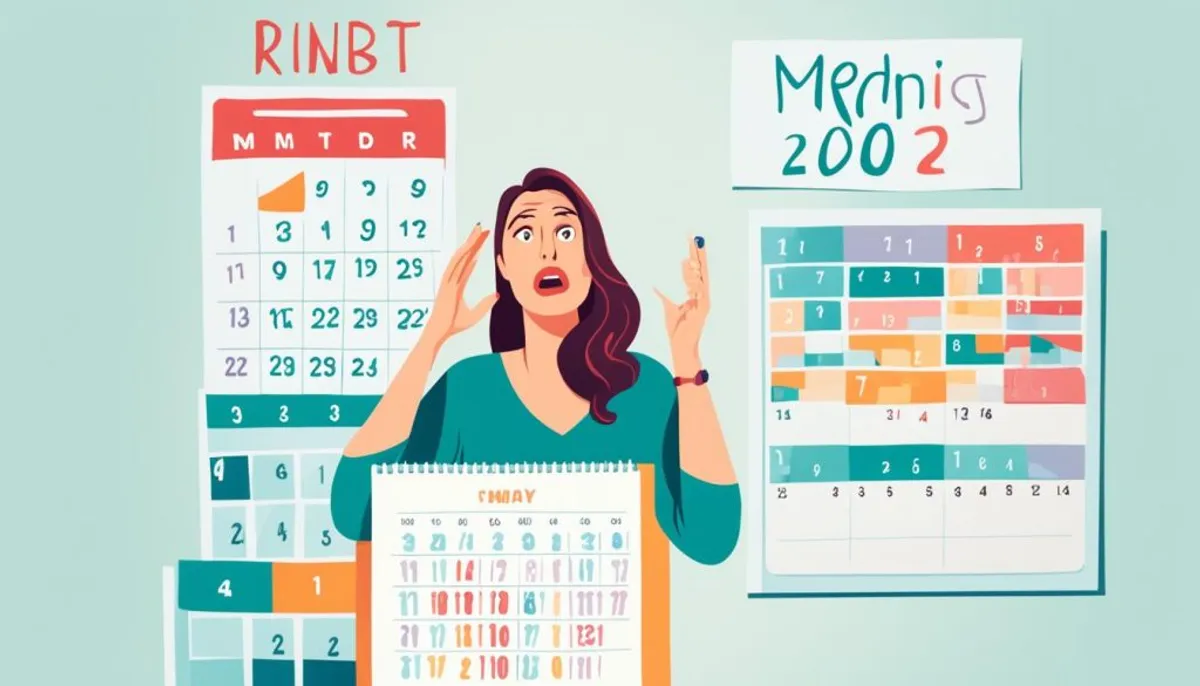Many women worry about irregular periods, and this worry can grow after they get married. The usual cycle length is about 28 days. But, if your cycle is shorter than 24 days or longer than 38 days, or changes a lot each month, it’s considered irregular. Studies show that stress, lifestyle changes, and hormonal shifts from marriage can lead to these irregularities.

Knowing how marriage might affect your periods can help you deal with this issue. We’ll look into what irregular menstrual cycles are, how marriage might be linked to them, and what causes and fixes these changes after marriage.
What are Irregular Periods?
Dealing with the menstrual cycle can be tough for many women. It’s key to know what irregular periods mean for your health and well-being.
Definition of Irregular Menstrual Cycles
The typical menstrual cycle lasts about 28 days. But, it can vary a lot from one person to another. If your cycle is shorter than 24 days or longer than 38 days, or changes a lot each month, it’s considered irregular.
Symptoms of Irregular Menstrual Cycles
Irregular periods can show up in different ways, like:
- Heavy or long periods
- Missing periods
- Unpredictable cycle timing
Many things can cause these issues, from hormonal problems to lifestyle changes. Knowing the cause is key to fixing the problem.
| Key Characteristics | Irregular Menstrual Cycles |
|---|---|
| Cycle Length | Less than 24 days or more than 38 days |
| Cycle Variation | Difference of more than 20 days from month to month |
| Symptoms | Heavy bleeding, missed periods, unpredictable timing |
Understanding irregular menstrual cycles helps you take steps to fix any issues. This keeps your reproductive system healthy and balanced.
Can Marriage Cause Irregular Periods?
Exploring the Potential Connection Between Marriage and Menstrual Irregularities
Marriage doesn’t directly cause irregular periods. But, the changes and stress that come with it can affect some women’s cycles. Emotional and hormonal shifts, along with changes in daily life, can disrupt the menstrual cycle.
Several factors link marriage to menstrual irregularities:
- Emotional Stress: Getting married can be emotionally challenging, leading to more stress. This stress can mess with the body’s hormonal balance and the menstrual cycle.
- Lifestyle Changes: Newlyweds often see big changes in their daily routines, sleep, and lifestyle. These changes can affect the menstrual cycle.
- Weight Fluctuations: Changes in weight, due to diet, exercise, or stress, can also impact the menstrual cycle.
The effect of marriage on menstrual irregularities varies among women. Some may not see any changes, while others might notice big differences. Knowing how marriage might affect menstrual health can help women manage any irregularities during this time, including crafting wedding blessings that foster emotional support and understanding.

Common Causes of Irregular Periods After Marriage
Many women find their periods become irregular after marriage. This can be worrying. But, there are many reasons why this happens.
Stress is a big reason for irregular periods after marriage. Getting married is a big change that can mess with your hormones. This can change when you get your period and how heavy it is.
Changing your daily routine can also cause irregular periods. Moving to a new home, changing your schedule, and adjusting to married life can throw off your body’s natural cycle.
- Weight fluctuations can affect your periods too. Losing or gaining a lot of weight can change the hormones that control your cycle.
- Starting or stopping hormonal birth control can also cause irregular periods. Your body is adjusting to new hormone levels.
- And, pregnancy is a big reason for irregular periods. The big changes in hormones during pregnancy can mess with your cycle.
Knowing these reasons can help women understand and deal with changes in their periods after marriage.
| Cause | Description |
|---|---|
| Stress | The transition of marriage can temporarily disrupt hormonal balance, leading to changes in the timing and flow of periods. |
| Changes in Daily Routine | Adjusting to a new living situation, schedule, and lifestyle after marriage can impact the body’s natural rhythms. |
| Weight Fluctuations | Significant gains or losses in body weight can affect the production of hormones that control the menstrual cycle. |
| Birth Control Use or Discontinuation | Starting or stopping hormonal birth control can cause irregular periods as the body adapts to the changes in hormone levels. |
| Pregnancy | The dramatic hormonal shifts during pregnancy can lead to irregular periods. |
Lifestyle Factors That Can Impact Your Menstrual Cycle
Getting married often changes your lifestyle in big ways. These changes can affect your menstrual cycle a lot. Stress, changes in your daily routine, and weight changes can make your periods irregular, missed, or heavier. Additionally, sending funny messages to lighten the mood can help alleviate some of that stress.
Stress and Your Menstrual Cycle
Stress can change the hormones that control your menstrual cycle. When you’re stressed, your body makes more cortisol. This hormone can mess with your reproductive hormones, leading to irregular or missed periods.
Routine Changes and Period Irregularity
Big changes in your daily habits, like those that come with marriage, can mess with your menstrual cycle. Changes in sleep, eating, and exercise can upset your body’s rhythm, making your periods irregular.
Weight Fluctuations and Menstrual Cycle
Big weight changes can affect your menstrual cycle. Weight changes can mess with hormone production and balance, causing irregular menstruation. Keeping a healthy weight is key for a regular menstrual cycle.
Understanding how stress, routine, and weight affect your periods can help women manage these factors. This way, you can keep your menstrual cycle regular and healthy after marriage.
Birth Control and Pregnancy: Hormonal Influences on Your Period
Birth control and pregnancy greatly affect menstrual cycles. Starting or stopping hormonal methods like the pill, patch, or IUD can make periods irregular. The body adjusts to new hormone levels, changing the cycle’s timing and flow.
Pregnancy also changes menstrual cycles, sometimes making periods miss or irregular. The body focuses on supporting a growing fetus instead of shedding the uterine lining. These hormonal shifts affect the menstrual cycle a lot.
It’s key to know how birth control and menstrual irregularities, how pregnancy affects menstrual cycle, and hormonal impacts on periods work together. Understanding these connections helps women manage their menstrual health during big life changes.
Knowing how hormonal changes from birth control or pregnancy affect your cycle is vital. By grasping these hormonal impacts on periods, you can handle changes better. This ensures your reproductive health stays a top priority.
When to Seek Medical Attention for Irregular Periods
Irregular periods can be frustrating and worrying for many women. Some changes in your cycle are normal, but some situations call for a doctor’s visit. Knowing when to go to your healthcare provider is key if you have irregular periods.
Identifying Potential Underlying Health Issues
Irregular periods might hint at a health issue. If your periods keep changing or you have severe symptoms like heavy bleeding or missing periods, see a doctor. These signs could mean you have conditions like polycystic ovarian syndrome (PCOS), endometriosis, or thyroid problems.
Your doctor can spot the underlying health conditions causing menstrual irregularities and treat them. They might run tests like blood work or scans to find the cause. Then, they can make a plan just for you.
Knowing when to see a doctor for irregular periods is important for your health. Don’t wait if you see big changes or have concerns about your cycle.

Conclusion
Marriage might not directly cause irregular periods, but many changes come with it. These changes include more stress, new routines, weight changes, and hormonal shifts from birth control or pregnancy. Additionally, sharing funny messages with your partner can help relieve stress and improve your overall well-being. These can affect your menstrual cycle.
If your periods stay irregular, seeing a doctor is key. They can check for health problems and help you find the right treatment. It’s important for your health to fix any menstrual issues. This can tell you about your hormonal balance and reproductive health.
Knowing how marriage and other factors can affect your periods helps you stay healthy. Your period shows how well you’re doing overall. So, if you’re worried, talk to a healthcare expert right away.
RelatedRelated articles



